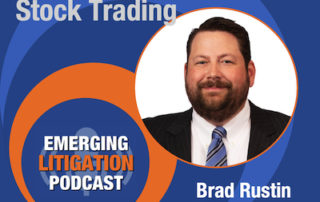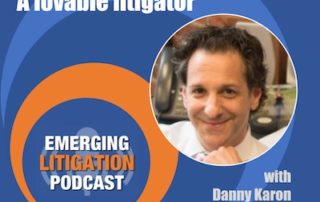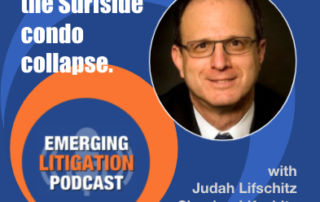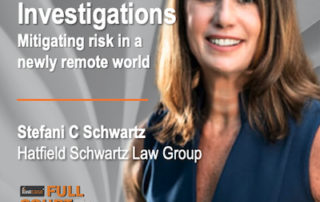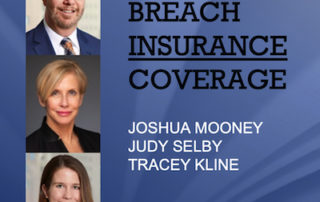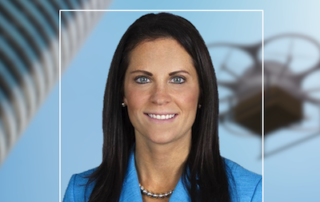Emerging Litigation Podcast
Gamification of Stock Trading with Brad Rustin
Gamification of Stock Trading with Brad Rustin "What's the deal?" you ask? Find out! Listen to my interview with FinTech attorney Brad Rustin, a partner with Nelson Mullins. In addition to chairing the firm’s Financial Services Regulatory Practice, Brad counsels financial institutions in regulatory matters, including strategic agreements, product development, and operational compliance. A large portion of his work is on bank and non-bank partnerships involving white-label deployments, FinTech partnerships, or payments, digital assets, cryptocurrency, and lending partnerships. Brad is a Certified Anti-Money Laundering Specialist (CAMS) by ACAMS and a Certified Regulatory Compliance Manager (CRCM) by the American Bankers Association. He received his JD, magna cum laude, from the University of South Carolina School of Law and his BA in Political Science and History, cum laude, from Furman University. And now, he is not only a guest on the Emerging Litigation Podcast, but the FinTech advisor on the Editorial Advisory Board of the Journal on Emerging Issues in Litigation. This podcast is the audio companion to the Journal on Emerging Issues in Litigation, a collaborative project between HB Litigation Conferences and the legal news folks at Law Street Media, and the Fastcase legal research family, which includes Docket Alarm and Judicata. If you have comments or wish to participate in one our projects, or want to tell me how insightful and informative our guests are, please drop me a note at Editor@LitigationConferences.com. Thanks to Brad for speaking with me about this fascinating subject. As for me, I will stay away from "game trading." Hearing people describe it reminds me of my PacMan obsession in college, which frequently cost me many hours that I should have spent differently, and too often a functioning shoulder. Tom Hagy As brokerages focus on enhancing user experience, they risk shifting their customer’s focus from serious financial decisions to a game-like experience. Some think this is a good thing. That [...]
A Special Episode: A lovable litigator with Danny Karon
A Special Episode: A lovable litigator with Danny Karon For 30 years attorney Daniel R. Karon has successfully represented plaintiffs and defendants in class-action and individual lawsuits. He's also chair of one of the leading class action conferences for lawyers, judges and law professors: the American Bar Association National Institute on Class Actions. He's passionate about educating up-and-coming lawyers. He teaches and writes extensively, and has been featured on podcasts and television news shows. While practicing law (handling some intensely serious matters), Danny became acutely aware of "a societal bias against access to justice where people who need justice the most often get it the least." One response to that was to launch Your Lovable Lawyer, a multi-media website whose goal is to "make justice more accessible to people who don’t know, can’t find, or can’t pay for lawyers." He endeavors to provide actionable insights regarding common legal problems. He refers to his "lovable" concept as "legal wellness," and encourages regular folks to take a proactive approach to legal matters and potential conflicts. This podcast is the audio companion to the Journal on Emerging Issues in Litigation, a collaborative project between HB Litigation Conferences and the Fastcase legal research family, which includes Full Court Press, Law Street Media, Docket Alarm and, most recently, Judicata. If you have comments or wish to participate in one our projects, or want to tell me how lovable Danny is, please drop me a note at Editor@LitigationConferences.com.
Impact of Surfside Condo Collapse with Judah Lifschitz
Impact of Surfside Condo Collapse with Judah Lifschitz Joining me is experienced construction law attorney Judah Lifschitz of Shapiro, Lifschitz & Schram who spoke about the near- and long-term impacts of the Surfside condo collapse not only in Florida around the country. Judah has extensive experience dealing with construction matters, representing clients in engineering, procurement and construction contracts and disputes. He represents and advises government agencies and private owners; regional, national and international contractors; construction managers and subcontractors; design professionals; and insurance companies. Notably, Judah won one of the largest liquidated damages awards in the history of the construction industry. Education: George Washington University, J.D.; Yeshiva University, B.A., magna cum laude. This podcast is the audio companion to the Journal on Emerging Issues in Litigation, a collaborative project between HB Litigation Conferences and the Fastcase legal research family, which includes Full Court Press, Law Street Media, Docket Alarm and, most recently, Judicata. If you have comments or wish to participate in one our projects, or want to tell me how insightful and informative Judah is, please drop me a note at Editor@LitigationConferences.com. Thanks to Judah for speaking with me about this important topic. I was especially proud that I pronounced his name correctly on the first try, though he assured me that I could in no way do more damage to it than those who have come before me. (Clearly he doesn't know me well.) Tom Hagy (pronounced HEY-ghee, for the record) Nothing illustrates the tragic consequences of building decay more than the June 24, 2021, collapse of the Champlain Towers South in Surfside, Florida, which claimed the lives of nearly 100 residents. The event raises questions about the building inspection process not only in Florida but around the country. What caused this calamity? Who is responsible? How many other buildings are in similar condition? Since any compensation for the loss of [...]
A Shameless Plug for Our Content Services
Your content marketing is everything you’ve ever dreamed of. Right?

Critical Legal Content was founded by Tom Hagy, former Editor & Publisher of Mealey’s Litigation Reports and VP at LexisNexis, founder of HB, current litigation podcaster and editor-in-chief. CLC’s mission is to help smaller firms and service providers not only create content — blogs, articles, papers, webinars, podcasts (like the stuff on this site) — but also to get it out there. How? Via social media, this website, your website, and potential via our podcast and journal which we publish in collaboration with vLex Fastcase and Law Street Media. The goal is to attract readers and dizzy them with your brilliance.
*Inspired by actual events.
Create content like a real legal publisher.
Emerging Litigation Journal
Workplace Investigations: Proactive Assessments Mitigate the Risk of Costly Litigation in a Newly Remote Environment
The Author Stefani C Schwartz is Senior Managing Partner at the Hatfield Schwartz Law Group LLC. She has devoted her career to representing and advising employers in the complete spectrum of employment law, including discrimination, harassment, retaliation, and wrongful termination. Stefani is a member of the Editorial Advisory Board of the Journal of Emerging Issues in Litigation. Interviews with leading attorneys and other subject matter experts on new twists in the law and how the law is responding to new twists in the world. Workplace Investigations: Proactive Assessments Mitigate the Risk of Costly Litigation in a Newly Remote Environment "Investigations are a straightforward, efficient, and effective way to combat the risk of litigation because they reflect the best aspects of the employer–employee relationship: understanding, respect, communication, and shared goals." Abstract: “Bullying, discrimination, sexual harassment and other forms of workplace misconduct can create a crisis for any company—and trying to ignore or cover it up will make a bad situation worse.” That’s the warning from a December 2021 article for Forbes, which goes on to say that in addition the damage to an employer’s reputation, a study by workplace misconduct reporting service Vault Platform found that workplace misconduct cost U.S. businesses more than $20 billion in 2021. In this article, the author discusses how proactively conducting workplace investigations can reduce an employer’s risk of winding up in court and paying the considerable tangible and intangible costs of misconduct, a risk further complicated by an increasingly home-based workforce. Excerpt: During the past two years, the COVID-19 pandemic has introduced new factors in the ever-shifting area of employer liability: large-scale layoffs and furloughs, the introduction and/or expansion of possibilities for remote work, the drive for a safe return to the physical workplace, and the dual needs for vaccination and accommodation of religious objectors [...]
Analysis of Target Decision that Loss-of-Use Damages Included Card Replacement Costs Post-Data Breach | By Joshua Mooney, Judy Selby, and Tracey Kline | Kennedys Law
A Significant Deviation: Target v. Ace Finds Loss-of-Use Damages Included Post-Breach Card Replacement Analysis On March 22, 2022, the United States District Court for the District of Minnesota ruled that two ACE insurers were obligated to indemnify Target Corporation (“Target”) for the amounts it paid to settle claims related to replacement of payment cards impacted in a data breach, vacating an earlier decision in which the court found that Target was not entitled to coverage. Target Corp. v. ACE Am. Ins. Co., No. 19-CV-2916 (WMW/DTS), 2022 WL 848095 (D. Minn. Mar. 22, 2022), vacating 517 F. Supp. 3d 798 (D. Minn. 2021). The new decision deviates from how other courts have evaluated general liability coverage for damages because of “loss of use of tangible property that is not physically injured.” Insurers would do well to take notice. Background In 2013, Target was the victim of a massive data breach that occurred after hackers installed malicious software on its computer network, which enabled them to steal the payment card data and personal contact information of an estimated 110 million individuals with Target payment cards (the “Data Breach”). Multiple lawsuits were brought against Target, including suits by financial institutions (the “Issuing Banks”) that had issued debit and credit cards (the “Payment Cards”) affected by the Data Breach. The Issuing Banks filed class action lawsuits against Target, which were consolidated, along with various consumer suits, in the United States District Court for the District of Minnesota, in In re: Target Corporation Customer Data Security Breach Litigation, All Financial Institutions Cases, MDL No. 14-2522 (the “Issuing Banks Litigation”). In their Consolidated Class Action Complaint, the Issuing Banks asserted various causes of action against Target, including a claim for negligence by which they alleged that Target breached its duty to implement adequate technical systems or security practices that could have prevented the loss of customers’ sensitive personal and financial [...]
Flying Cameras: Gaps in Drone Regulation and How Courts Can Fill Them … at Least for Now
Authors With deep experience in the law and regulation of unmanned aerial vehicles, Kathryn practices in the Providence, R.I., offices of Robinson+Cole. She is a member of the firm’s groups that focus on business litigation, data privacy and security, and drone compliance. Kathryn is also a member of the Editorial Board of Advisors for the Journal on Emerging Issues in Litigation and the Emerging Litigation Podcast. Blair Robinson is a cybersecurity intern at Robinson+Cole. She will graduate in 2023 with a J.D. from the Roger Williams University School of Law to complement her Masters of Science degree in Cybersecurity also from Roger Williams University. Get CLE Flying Cameras: Gaps in Drone Regulation and How Courts Can Fill Them … at Least for Now Drones have rapidly transformed dozens of industries since hitting the commercial market. International aid groups use medical drones to deliver life-saving medications and vaccines to remote areas. Agricultural drones have revolutionized how farmers tend their fields. Film and television producers embrace drones for their ability to capture once prohibitively expensive or outright impossible camera shots. Hobbyists love the technology for a variety of recreational purposes. However, as drones have become increasingly commonplace, lawmakers and policymakers have struggled with effectively regulating this emerging domain. In addition, no federal law, state law, or industry best practice adequately addresses the unique privacy and cybersecurity risks drone operations pose. Until federal regulation catches up with the technology, lawyers could move courts to mitigate the issue by arguing for strict liability for drone operators and manufacturers. Although drones may seem like traditional aircraft, they actually pose unique privacy concerns. Drone systems rely on real-time and simultaneous data exchanges between the operator, GPS positioning, cloud-based processing and telemetry, and the drone itself. Each facet in such a complex system presents a new opportunity for attackers. Besides the vulnerability [...]

